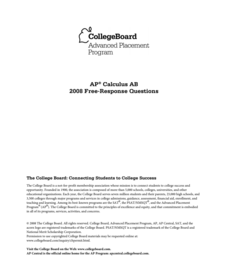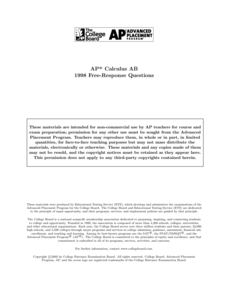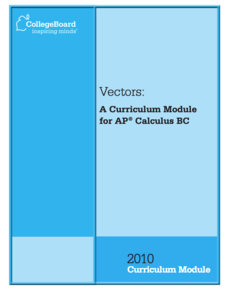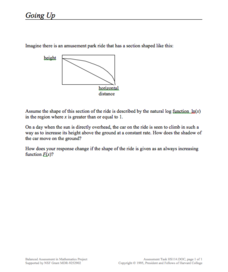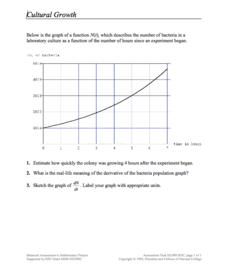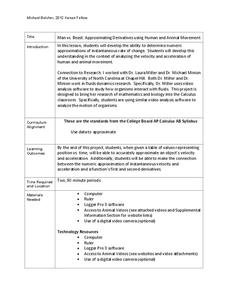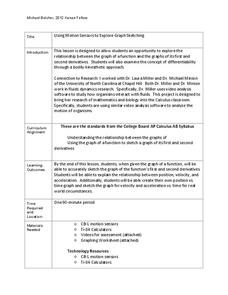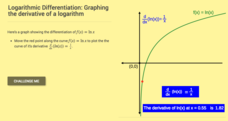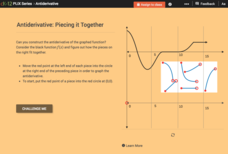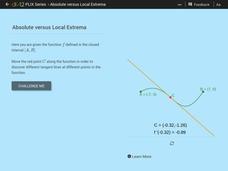College Board
2000 AP® Calculus BC Free-Response Questions
How are concepts divided? Pupils use the AP® Calculus free-response questions to see how the exam addresses concepts. The concepts are divided into those that use calculators and others that do not. Calculator items require finding...
College Board
1999 AP® Calculus BC Free-Response Questions
Get a 20/20 view of the exam. Free-response questions from the 1999 Calculus BC exam provide an insight to the exams. Pupils review the questions to see how topics show up on the test. Topics range from particle motion along a function,...
College Board
1998 AP® Calculus BC Free-Response Questions
Provide a test run. Pupils use the questions to practice taking the free-response section of the AP® Calculus BC exam. Teachers see the different ways questions appear on the exam to prepare individuals for whatever comes their way on...
College Board
2008 AP® Calculus AB Free-Response Questions
Get the most out of released items. Teachers use the included materials to learn about test-takers' performance on released free-response questions. Pupils respond to the questions and compare their responses to sample scored responses...
College Board
2005 AP® Calculus AB Free-Response Questions
Develop an awareness of the exam. Pupils and teachers use the six release free-response questions to see how the exam covers topics. The questions are divided among calculator and non-calculator items. Scholars see the importance of...
College Board
2003 AP® Calculus AB Free-Response Questions
Take a free look. Released free-response questions from the 2003 AP® Calculus AB exam show how questions cover different topics. Pupils and teachers review the topics of bounded regions, particle movement, rates, relationships between...
College Board
2002 AP® Calculus AB Free-Response Questions
Peek behind the curtain. Using a helpful resource, teachers and pupils see the way concepts appear on the AP® Calculus exam. Scholars use the questions to prepare for their own exams, gaining quality practice before test day. Questions...
College Board
2000 AP® Calculus AB Free-Response Questions
Gain an upper hand in preparation for the exam. Teachers and pupils use six released questions to gain an understanding of the AP® Calculus exam. By answering the questions, scholars see how different concept of the course show up on the...
College Board
1999 AP® Calculus AB Free-Response Questions
Gain an understanding of the test before taking your own. Scholars develop an understanding of how calculus concepts appear on the AP® exam. The six released questions come from across the curriculum and include particle movement and...
College Board
2004 AP® Calculus AB Free-Response Questions
Develop a deeper understanding of calculus. The released item and support materials allows teachers and pupils to dig deeper into calculus topics. Scholars use the commentary and descriptions of the items to gain a better understanding...
College Board
2001 AP® Calculus AB Free-Response Questions
Take a closer look at the exam. Released items from the 2001 Calculus AB exam allow teachers and pupils to view how the exam presents questions. Scholars use the questions to prepare for the test and compare their responses to the...
College Board
1998 AP® Calculus AB Free-Response Questions
Take a peek into the exam. Released items from the Calculus AB exam provide pupils insight into how questions appear on the exam. The six questions range from finding the area under a curve and the volume of the revolution to working...
College Board
Vectors: A Curriculum Module for AP® Calculus BC
It is all in a matter of time. The model curriculum module uses parametric equations and vectors to solve problems dealing with particle motion along a curve. At the beginning of the lesson, the unit reviews parametric equations and...
Concord Consortium
Broken Spreadsheet II
Work in reverse with the product becoming the given. Using a spreadsheet image of the graph of a trigonometric function, young scholars investigate methods of creating spreadsheet data that results in the given graph. The catch? The data...
Concord Consortium
Going Up
Going on up—and up and up! An open-ended task asks learners to model the movement of an amusement ride with parametric equations. They then analyze their equations to determine how the shadow of the ride's car moves as it rises at a...
Concord Consortium
Cultural Growth
Scholars read and interpret a graph relating bacterial growth in a culture over time. They apply knowledge of derivatives, estimation, and graphing to the skill practice questions.
Project Maths
Introduction to Calculus
Don't let your class's heart rates rise as you introduce them to differentiation ... an inquiry-based lesson helps them keep it in check! The second lesson in a three-part series asks learners to analyze the rate of change of different...
Kenan Fellows
Man vs. Beast: Approximating Derivatives using Human and Animal Movement
What does dropping a ball look like as a graph? An engaging activity asks learners to record a video of dropping a ball and uploading the video to software for analysis. They compare the position of the ball to time and calculate the...
Kenan Fellows
Using Motion Sensors to Explore Graph Sketching
Get moving to a better understanding of graphs of derivatives. Using motion sensors, scholars vary their velocities to create graphs of the first derivative of a function. The activity challenges groups to first create a script of the...
Shodor Education Foundation
Derivate
Derive tangent lines through derivatives. Scholars use an app to graph functions and investigate derivatives and tangent lines. The interactive automatically graphs a tangent line at a specified point and can also produce tables of values.
CK-12 Foundation
Logarithmic Differentiation: Graphing the Derivative of a Logarithm
Log the values of the derivative of a logarithm. The interactive plots the derivative of the natural logarithm. Learners first determine the derivative of natural logarithm and the general logarithm. Using the formulas for the...
CK-12 Foundation
Antiderivative: Piecing it Together
Build a function backwards. Given a graph of the derivative of a function, pupils piece together a graph of the original function, the antiderivative. Learners use their graphs and the graphs of the derivatives to answer questions about...
CK-12 Foundation
Absolute Extrema and Optimization: Building the Biggest Box
Optimally, you want the largest box. Given a square piece of box material, pupils determine the size of congruent squares to cut out of the corners to create a box with the greatest volume. Learners determine the equation of the volume...
CK-12 Foundation
Absolute Versus Local Extrema
Get the class to take an extreme look at functions. The interactive presents a function on a closed interval with a movable tangent line. Using the given function, pupils determine the extrema, critical points, and points of inflection.





